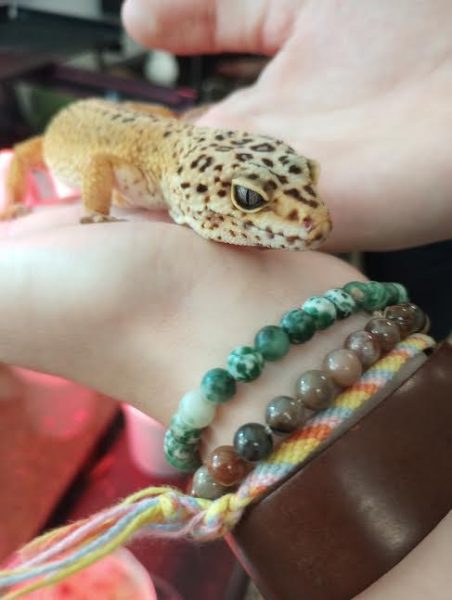
Chances are, at some point early in your life, you begged your parents for a pet. Maybe it was a cat or dog, maybe it was a little more adventurous: a lizard, a fish, or a bunny. Whether or not you got the pet, as a kid you probably were not concerned about where that animal came from. When I was a child wandering through the aisles of PetSmart, I was certainly much more interested in the cute animals and their tiny homes than in the quality of treatment they received.
The phrase “Adopt, Don’t Shop” was started in the 1980s by animal rights nonprofit Last Chance For Animals and became increasingly popular in the 2010s as a way to encourage prospective pet owners to adopt from shelters rather than buy from chain stores, breeders, or online. In the time since, the concept of animal rights, especially for pets, has gained significant recognition. Still, it wasn’t until the 2000s and 2010s that people became more aware of the connection between stores and puppy mills — large-scale breeding facilities — due to campaigns like The American Society for the Prevention of Cruelty to Animal’s “No Pet Store Puppies,” which increased public disapproval of pet stores selling animals. While the sale of dogs and cats in pet stores is no longer as common, reptiles and small animals are still easy to find and purchase at large chain pet stores.
Although many have stopped supporting these large pet stores, small pets are still routinely purchased at these businesses. This can be an issue, especially for inexperienced owners; when people can just walk in and buy an animal anytime they want, they often don’t have the resources or knowledge needed to care for it.
Reptiles, among the pets that can be easily bought at these large stores, additionally face a lack of cultural pet-care knowledge, the likes of which does exist for more common pets. This stems from the fact that Americans did not start owning reptiles as pets until the 1940s. In the ‘80s and ‘90s, the hobby really took off; more stores, especially large ones, were selling reptiles and small mammals, and they quickly became some of the most sought-after exotic pets. The more recent growth in popularity means the care of the still niche pet isn’t an intuitive one for most owners.
Dru Morales, owner of Portland’s HISSS the Reptile Shop, says that while large chain stores can mean well, they “don’t specialize in reptiles, so their staff may not have the depth of knowledge or time to provide accurate care advice.” This is one of the reasons that he recommends people go to local, specialty stores that are able to focus more on providing accurate information and ensuring people make informed decisions when buying reptiles. Luthien Rapier, a senior at Franklin and owner of multiple reptiles, also says supporting local shops is the more ethical decision: “I think that Petco is definitely not the best place to buy a reptile … you should go to local pet stores that really care for the animals.”
For some people, going to a specialty store may seem too expensive or specific for their needs. While privately owned rescues or organizations may be more pricey, this is often due to higher quality environments and treatment. Chelsea Davis, co-founder of Animal Rights Collective Portland, explains that rescues can devote extra care to their animals when they can charge appropriately.“I adopted an animal that had to have this really big surgery, so his adoption fee … was [doubled],” she explains of her personal experience. To her, this characterized an attention to the animal’s health that larger places like Petco might not be aware of.
Another big problem around the adoption of reptiles is the lack of knowledge surrounding proper care. Morales says that the common thought that reptiles are low-maintenance is a misconception. “[Reptiles] require very specific care: temperature gradients, [ultraviolet] lighting,” as well as “correct humidity and species-specific diets. They aren’t low-maintenance pets,” remarks Morales. This is something that Morales does his best to address at his store. He says, “We want to make sure every animal goes to a prepared and informed home.” This mission is supported by the services HISSS offers, including educational outreach, high-quality habitat supplies, and assistance with enclosure set-up, diet, and daily care before their animals go home.
When looking into adopting a reptile, it is important to do your own research. It can be hard to know where to start when there is so much conflicting advice online. This is why finding reputable resources is important. Davis says one way to do this is to look for places that allow interaction with the animals before adoption. This is a great way to practice hands-on interaction and learn more about the animal.
Despite the time and effort the adoption process takes when buying from a smaller pet store, owning a pet is an incredibly rewarding experience. Even reptiles, who may not seem like loving pets, “are incredibly intelligent and observant. … They absolutely have personalities and preferences,” says Morales. Rapier also expresses her love of owning reptiles, describing them as fun and interesting pets. If you are interested in owning a unique pet, do not be deterred by the amount of care and knowledge required. Approaching with good intentions and respect for the animal will lead to fulfilling pet ownership.



































